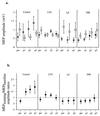Mechanisms of use-dependent plasticity in the human motor cortex
- PMID: 10716702
- PMCID: PMC16296
- DOI: 10.1073/pnas.97.7.3661
Mechanisms of use-dependent plasticity in the human motor cortex
Abstract
Practicing movements results in improvement in performance and in plasticity of the motor cortex. To identify the underlying mechanisms, we studied use-dependent plasticity in human subjects premedicated with drugs that influence synaptic plasticity. Use-dependent plasticity was reduced substantially by dextromethorphan (an N-methyl-d-aspartate receptor blocker) and by lorazepam [a gamma-aminobutyric acid (GABA) type A receptor-positive allosteric modulator]. These results identify N-methyl-d-aspartate receptor activation and GABAergic inhibition as mechanisms operating in use-dependent plasticity in intact human motor cortex and point to similarities in the mechanisms underlying this form of plasticity and long-term potentiation.
Figures




References
-
- Pascual-Leone A, Grafman J, Hallet M. Science. 1994;263:1287–1289. - PubMed
-
- Karni A, Meyer G, Jezzard P, Adams M M, Turner R, Ungerleider L G. Nature (London) 1995;377:155–158. - PubMed
-
- Nudo J R, Wise B M, SiFuentes F, Milliken G W. Science. 1996;272:1791–1794. - PubMed
-
- Classen J, Liepert A, Wise S P, Hallett M, Cohen L G. J Neurophysiol. 1998;79:1117–1123. - PubMed
-
- Rioult-Pedotti M-S, Friedman D, Hess G, Donoghue J P. Nat Neurosci. 1998;1:230–234. - PubMed
Publication types
MeSH terms
Substances
LinkOut - more resources
Full Text Sources
Other Literature Sources
Medical

